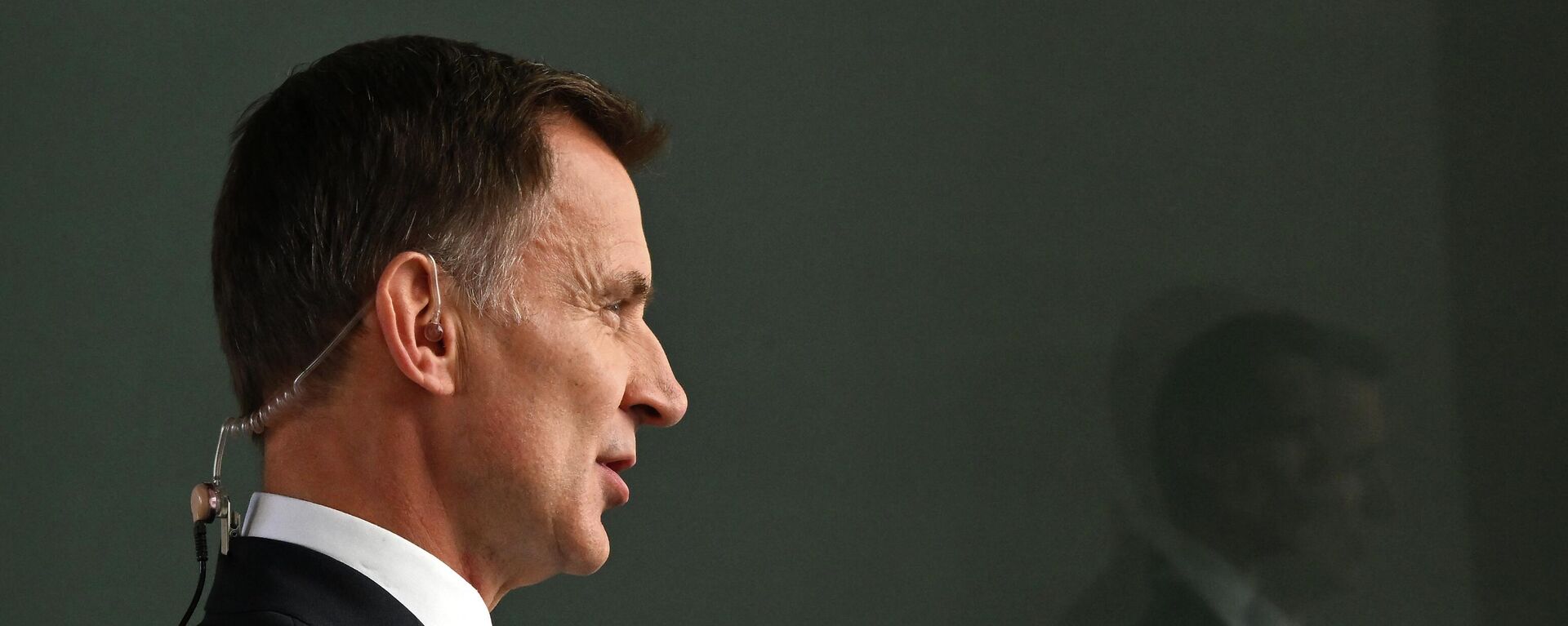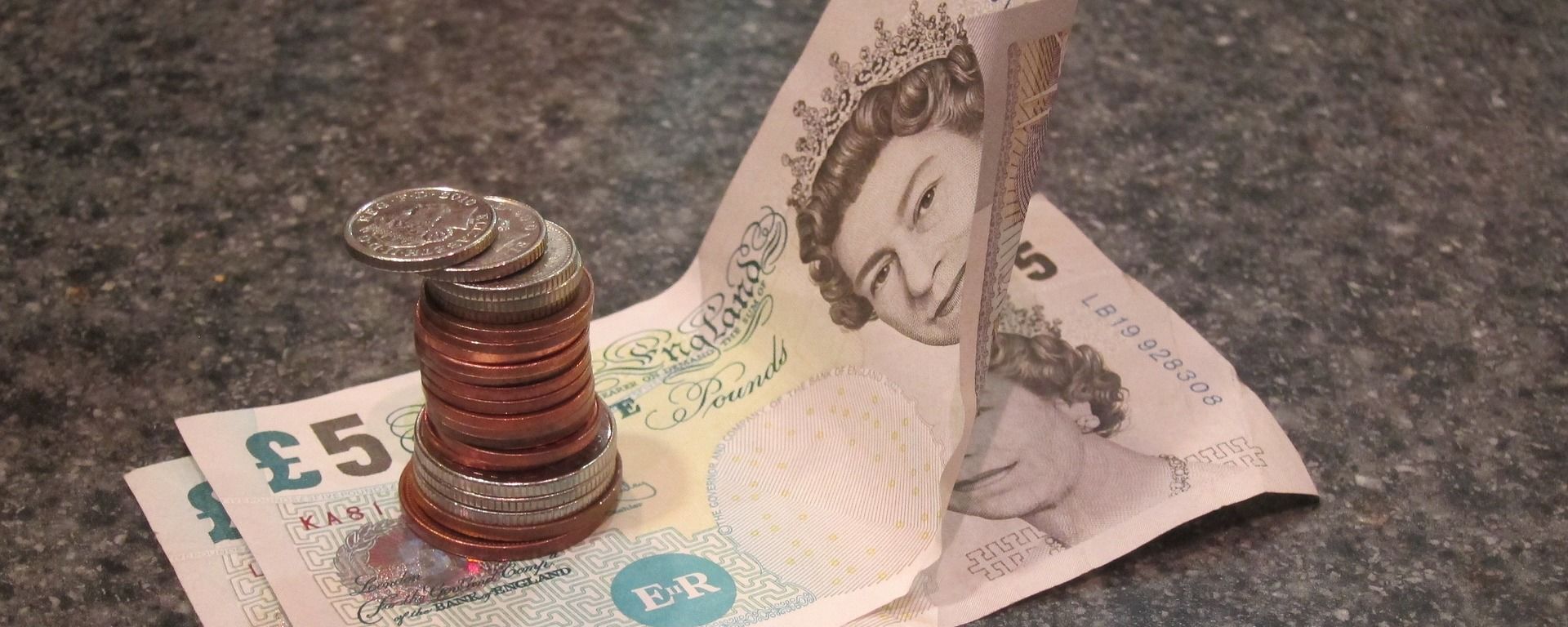https://sputnikglobe.com/20221111/uk-chancellor-reportedly-has-austerity-spending-squeeze-planned-post-2025-election-1104015022.html
UK Chancellor Reportedly Has 'Austerity' Spending Squeeze Planned Post-2025 Election
UK Chancellor Reportedly Has 'Austerity' Spending Squeeze Planned Post-2025 Election
Sputnik International
UK Chancellor Jeremy Hunt earlier warned of looming spending cuts, as the Institute for Fiscal Studies said on October 11 that only tightened fiscal policy and... 11.11.2022, Sputnik International
2022-11-11T12:33+0000
2022-11-11T12:33+0000
2023-05-28T15:25+0000
world
jeremy hunt
inflation
liz truss
kwasi kwarteng
public spending
united kingdom (uk)
https://cdn1.img.sputnikglobe.com/img/07e6/0a/11/1101924745_0:0:3071:1728_1920x0_80_0_0_1177ce5a75888f190ef1c69c4139eacf.jpg
UK Chancellor Jeremy Hunt is planning to announce an impending big squeeze on government spending to last for three years after the next election in 2025, according to media reports.The plan to impose austerity on public services in order to plug in the country’s fiscal debt hole will be unveiled at the next fiscal event – the Autumn Statement – to be delivered to parliament on November 17. According to cited UK Treasury sources, the national debt is estimated at slightly over £50bn a year by 2027-28. Hunt is described as likely to go with a freeze on day-to-day public spending in real terms under the conviction that it could save about £27bn annually by 2028.Balancing Tax Hikes & Spending CutsWhile going along with the fiscal proposals outlined in last year’s Spending Review, presupposing average real terms growth of 3.3 percent in departmental running costs budgets between 2021-22 and 2024-25, the three years after that period would reportedly envisage “much more restraint.” This March, then-chancellor Rishi Sunak had unveiled planned annual growth in day-to-day public spending of 3.7 percent during the three years after 2024-25. But now Hunt allegedly intended to shrink the growth in public spending in that period to 2 percent or lower to maintain levels in line with consumer price inflation. The mulled move could be instrumental in saving the UK government £23bn by 2027-28, UK media reports assessed.However, the fiscal decision would come as public sector budgets are already under severe strain amid the ongoing sure of inflationary pressures. According to the Bank of England, the UK entered recession in the third quarter of this year, amid soaring global energy and goods prices. Previously, it was reported that the Chancellor of the Exchequer hoped to get his hands on the profits of banks and oil and gas companies to stabilize the public debt. In the wake of the failed economic policy of Liz Truss's brief stint at Downing Street, 10, Hunt, who scrapped almost all measures of the original controversial tax-slashing plan to support the country’s economy, proposed by his predecessor, Kwasi Kwarteng, warned the authorities, in particular the defense ministry, to brace themselves for spending cuts. Hunt had set his mind on balancing out tax hikes and reduction of public spending as the Institute for Fiscal Studies warned that the UK government needed to tighten its fiscal policy and cut spending by more than 60 billion pounds ($66 billion) if it had any hope of stabilizing the public debt situation. The report comes as the Bank of England recently predicted that the country’s longest recession that began in the third quarter is likely to last into 2024. As unemployment is predicted to soar to 6.5 percent over the next two years, Britain is facing a bitter cost of living squeeze. With the energy crisis having a knock-on effect on prices of other necessities, since the summer a spate of British unions have gone on strikes. Railway, seaport and postal workers have all walked out as pay failed to keep up with surging inflation.
https://sputnikglobe.com/20221014/kwasi-kwarteng-reportedly-sacked-as-uk-finance-minister-1101843492.html
https://sputnikglobe.com/20221011/uk-needs-to-cut-spending-by-over-66bln-to-stabilize-public-debt-think-tank-says-1101720883.html
united kingdom (uk)
Sputnik International
feedback@sputniknews.com
+74956456601
MIA „Rossiya Segodnya“
2022
News
en_EN
Sputnik International
feedback@sputniknews.com
+74956456601
MIA „Rossiya Segodnya“
Sputnik International
feedback@sputniknews.com
+74956456601
MIA „Rossiya Segodnya“
uk chancellor jeremy hunt is to announce a squeeze on government spending to last for three years after the next election in 2025, the plan to impose austerity on public services to plug in the fiscal debt hole will be unveiled at the autumn statement
uk chancellor jeremy hunt is to announce a squeeze on government spending to last for three years after the next election in 2025, the plan to impose austerity on public services to plug in the fiscal debt hole will be unveiled at the autumn statement
UK Chancellor Reportedly Has 'Austerity' Spending Squeeze Planned Post-2025 Election
12:33 GMT 11.11.2022 (Updated: 15:25 GMT 28.05.2023) UK Chancellor Jeremy Hunt earlier warned of looming spending cuts, as the Institute for Fiscal Studies said on October 11 that only tightened fiscal policy and slashing expenditure by more than 60 billion pounds ($66 billion) could stabilize the country's public debt.
UK
Chancellor Jeremy Hunt is planning to announce an impending big squeeze on government spending to last for three years after the next election in 2025, according to media reports.
The plan to impose austerity on public services in order to plug in the country’s fiscal debt hole will be unveiled at the next fiscal event – the Autumn Statement – to be delivered to parliament on November 17. According to cited UK Treasury sources, the national debt is estimated at slightly over £50bn a year by 2027-28. Hunt is described as likely to go with a freeze on day-to-day public spending in real terms under the conviction that it could save about £27bn annually by 2028.
Balancing Tax Hikes & Spending Cuts
While going along with the fiscal proposals outlined in last year’s Spending Review, presupposing average real terms growth of 3.3 percent in departmental running costs budgets between 2021-22 and 2024-25, the three years after that period would reportedly envisage “much more restraint.” This March, then-chancellor Rishi Sunak had unveiled planned annual growth in day-to-day public spending of 3.7 percent during the three years after 2024-25. But now Hunt allegedly intended to shrink the growth in public spending in that period to 2 percent or lower to maintain levels in line with consumer price inflation. The mulled move could be instrumental in saving the UK government £23bn by 2027-28, UK media reports assessed.
However, the fiscal decision would come as public sector budgets are already under severe strain amid the ongoing sure of
inflationary pressures. According to the Bank of England, the UK entered recession in the third quarter of this year, amid soaring global
energy and goods prices.

14 October 2022, 11:36 GMT
Previously, it was reported that the Chancellor of the Exchequer hoped to get his hands on the profits of banks and oil and gas companies to stabilize the public debt. In the wake of the failed economic policy of Liz Truss's brief stint at Downing Street, 10, Hunt, who scrapped almost all measures of the original
controversial tax-slashing plan to support the country’s economy, proposed by his predecessor, Kwasi Kwarteng, warned the authorities, in particular the defense ministry, to brace themselves for spending cuts. Hunt had set his mind on balancing out tax hikes and reduction of public spending as the Institute for Fiscal Studies warned that the UK government needed to tighten its fiscal policy and cut spending by more than 60 billion pounds ($66 billion) if it had any hope of stabilizing the public debt situation.

11 October 2022, 11:59 GMT
The report comes as the Bank of England recently predicted that the country’s longest recession that began in the third quarter is likely to last into 2024. As unemployment is predicted to soar to 6.5 percent over the next two years, Britain is facing a bitter cost of living squeeze. With the energy crisis having a knock-on effect on prices of other necessities, since the summer a spate of British unions have
gone on strikes. Railway, seaport and postal workers have all walked out as pay failed to keep up with surging inflation.





